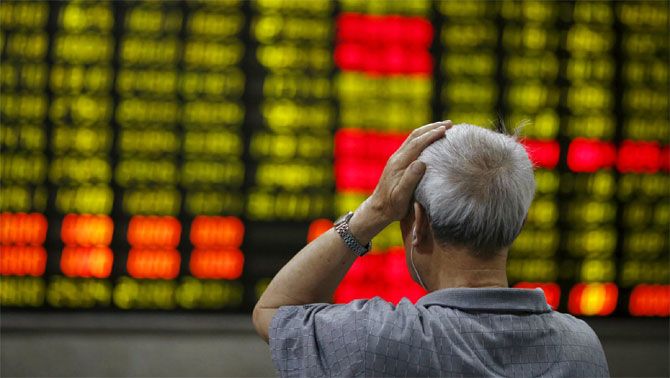 | « Back to article | Print this article |
On August 11, the central bank devalued the yuan by about 2 per cent against the US dollar, the biggest one-day currency devaluation in nearly two decades.
 China on Tuesday said its foreign trade in August decreased 9.7 per cent year on year to about $320.8 billion amid rising concerns over the record drop of $93.9 billion in the Communist giant's foreign exchange reserves last month.
China on Tuesday said its foreign trade in August decreased 9.7 per cent year on year to about $320.8 billion amid rising concerns over the record drop of $93.9 billion in the Communist giant's foreign exchange reserves last month.
Latest data released by General Administration of Customs shows that while exports fell 6.1 per cent year on year to 1.2 trillion yuan, compared with an 8.9 per cent drop in July, the imports slumped 14.3 per cent to 836.1 billion yuan, compared with July's decrease of 8.6 per cent.
Trade surplus expanded by 20.1 per cent to 368 billion yuan in August. In the first eight months of 2015, foreign trade slipped 7.7 per cent year on year to 15.67 trillion yuan, the GAC figures showed.
Exports dipped 1.6 per cent to 8.95 trillion yuan in the January-August period, while imports fell 14.6 per cent to 6.72 trillion yuan.
Analysts said the recent nearly four per cent devaluation of Yuan also helped to push up the value of exports from China, world's largest trading nation.
Qu Hongbin, chief China economist at HSBC, attributed the slump in export growth mainly to sluggish external demand, especially exports to the European Union and Japan.
Meanwhile, China's foreign exchange reserves fell for the fourth straight month to $3.56 trillion in August, down by a record $93.9 billion from the previous month.
China, the holder of world's largest forex reserves $3,771,347 millions, has accrued its massive foreign exchange reserves by its successful exports in the past few decades.
About $1.20 trillion of forex reserves were saved in American bonds.
The current foreign exchange reserves mirrored a sluggish foreign trade, said Tan Yaling, dean of the Beijing-based China Forex Investment Research Institute.
"The yuan began to fluctuate in August, and is not the reason for the depletion in reserves since May," she told official daily Global Times.
On August 11, the central bank devalued the yuan by about 2 per cent against the US dollar, the biggest one-day currency devaluation in nearly two decades.
"The country's accumulation of foreign exchange reserves was driven by a huge trade surplus over decades," Tan said, adding that slower export growth for some months in the past also affected the amount of foreign exchange reserves.
The sudden drop has sparked off speculation that People's Bank of China is selling dollars to support the weakening yuan.
Image: A Chinese investor reacts. Photograph: Reuters